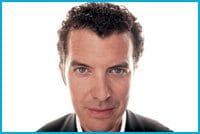Comic Rick Mercer lives in a surreal zoo; it’s unclear who are the keepers and who are the animals. He regularly bites the hand that feeds him, yet no politician can resist a good sound bite; they return repeatedly to be savaged. The public crowds around the cage, lapping it up.
Canada’s feared and revered satirist returns to the CBC on Tue, Oct 2 for the fifth season of Rick Mercer Report. He’s also just launched his second book, Rick Mercer Report: The Book, featuring a selection of rants from the show, a few quips from the politician segments and excerpts from his blog. Arranged thematically, it’s a surprisingly engaging poli-sci primer just in time for a looming federal election. Who knew TV could make good reading?
All those travesties of justice we too soon forget are here to haunt anew: the Liberal sponsorship scandal, the wing nuts rattling round the Tory caucus, Jack Layton’s mustache. “Politicians and parties are very adept at what they call changing the channel,” says Mercer. “They just want to change the channel and forget an issue right away: ‘We dealt with that; we’re moving on.’
“So it’s good to have something out there to remind people who these [politicians] actually are.”
Mercer is at his best with a clear target. Nothing gets his goat more than hypocrisy and mean-spiritedness.
“In the same-sex marriage debate the people who really bothered me were the ones who would tell me that they supported same-sex marriage, that they had lots of gay friends, that in their world it’s completely normal, what have you,” says Mercer, “and yet they would go back and vote against it because they were pandering to their constituency. In many cases they would say, ‘Well, this is what my constituency wants,’ when there’s evidence that, in fact, that wasn’t what their constituents really cared about.
“Those are the people who bugged me the most… the people who are just doing it for crass political reasons or as a wedge issue.”
One of Mercer’s fave segments in the book details a delightful case of just desserts from 2005 involving Jason Kenney, the stupefying Calgary Southeast MP recently named secretary of state for multiculturalism and Canadian identity. During the early same-sex marriage debates Kenney famously argued that gay men and lesbians already had the right to marry as long as it was to someone of the opposite sex. Mercer labels Kenney, “a gift that keeps on giving.”
“A number of Conservatives had started hijacking domain names [matching the names of Liberal MPs], using them for putting up antiabortion websites,” says Mercer. “Don Boudria was quite upset by this because they had created this fake Don Boudria website that looked like his website, but when you clicked on ‘More about Don,’ you got pictures of aborted fetuses and stuff.” Mercer watched a dramatic exchange over the distasteful tactics on the floor of the House of Commons. “Don Boudria was really upset, like he was legitimately upset, personally upset. And this is why I started watching the House of Commons because it’s not often that you see people that legitimately upset about something.
“Jason Kenney was just a pig to him. He said, ‘You’re ignorant. Anyone who doesn’t protect and control their domain names is ignorant and fair game.’ And I was watching this thinking, what are the chances of Jason Kenney not owning his domain name if he’s calling Don Boudria an ignoramus?
“Of course he didn’t. So I bought it. Then I had it pointed at [national queer lobby group] Egale all during the same-sex marriage debate — which apparently was driving him completely crazy because he was worried that his constituents out there in Alberta might think he secretly supported the work of Egale.
“I like that a lot.”
Surprisingly, Mercer refuses to write off politicians and politics wholesale. If he did, he says, he wouldn’t be a good satirist. “You absolutely have to love your subject matter and I actually do love politics. I mean I always follow politics in the off season as much as I do in the on season. It’s just in my blood; it’s my sport.
“I genuinely believe that most of the MPs are in it for the right reasons, even the ones I disagree with. I think most of them work very hard. It’s a really hard life, there’s more negatives than positives.”
With a federal election this fall a distinct possibility, Mercer is rubbing his greedy hands with glee. Excited isn’t the word. “Are you kidding me? If politics is like my baseball, then an election is like the World Series. From a practical point of view, I don’t think minority governments are that great. I think elections every two or three years are not that great because governments stop making long-term plans and they’re just campaigning all the time. Personally, from my TV point of view, I would like an election every fall. I would like the writ to drop on Oct 2 the day my show opens.”
Mercer is keenly aware of what he calls the “mutually parasitic” relationship between politician and satirist. One of the ballsiest segments he ever did, which is detailed in the book, was the sleepover at 24 Sussex with Stephen Harper’s kids. There was the prime minister reading a bedtime story to pyjama-wearing Mercer during the Tory government’s attempt to “revisit” same-sex marriage rights. Demented.
“I knew it was going to upset some people,” says Mercer. “There were people upset on all sides.”
It sent the show’s ratings through the roof and gave Harper some much-needed humanizing. “There might be a special place in hell for me,” Mercer admits.
Mercer’s politics are hard to codify. He’s a lefty on most human rights issues, yet he’s an ardent supporter of the armed forces, heading to Afghanistan to entertain the troops and accepting recently an honourary post of colonel with a Halifax-based helicopter squadron. Toeing the party line — any party — is not for him. “The great luxury of being a satirist or a commentator is that you don’t have to do that, you can just say it the way you see it. The downside of that is you get all sorts of criticisms from various constituencies, each who see you as one of their own. If I say something about missile defence, suddenly I’ll get all these people saying, ‘How can you say that? You’re one of us and we’re against that.’ Well, I’m not one of you; I’m just one guy here making my opinion.”
Following a string of TV successes including This Hour has 22 Minutes and Talking with Americans, Mercer acknowledged he was gay in a Globe and Mail story almost four years ago; the Mercer Report’s executive producer Gerald Lunz is Mercer’s partner. “I never ever hid the fact that I was gay,” says Mercer. “I made a decision a long time ago that if anyone ever asked about my personal life — granted, I like to keep my personal life as personal as I can — I would never be comfortable with saying I wasn’t gay because that’s just not the facts. I mean I just couldn’t do that.
“But Canadians are so polite that in six or seven years of national media interviews, no one ever asked me the question…. So someone eventually did and I did what I always knew I’d do, I said, ‘Yes I’m gay. I’ve lived with someone for a long, long time.'”
There he was, the most popular comic in the country, more beloved than Anne Murray, and when he came out it barely caused a ripple. “There was a big collective shrug. No one cared,” says Mercer. “It’s a big difference between the times we are living in and even 20 or 30 years ago. Obviously I’m very fortunate that way. Really I can’t think of a single incident where it ever affected my career at all.”
Mercer has come a long way from being a loudmouth kid in St John’s. Recognized coast to coast to coast, he obviously relishes jetting around the country profiling ordinary Canadians and skewering the high, mighty and haughty. What is life like as a Canadian celebrity? “The only real difference is that everyone at Air Canada is actually really nice to me… that might not be the experience for all Canadians.”


 Why you can trust Xtra
Why you can trust Xtra


